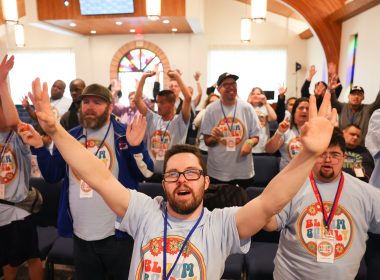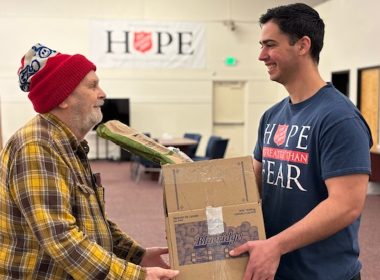Now six months into her officership, Lt. Erin Wikle reveals some of the lessons she’s learned.
By Erin Wikle, Lt. –
A few months ago, I shared my thoughts on officership as a freshly minted Lieutenant. At the time, less than three months undergirded my experience. Now, having surpassed my six-month mark and having survived my first Christmas, the following summarizes the top five concepts that have most radically changed my understanding of this reality: with rank comes real life.
If it doesn’t challenge you, it doesn’t change you.
I recently framed a photo of a few of us following a prayer and worship gathering we attended together. One of the guys pictured recently graduated from the Adult Rehabilitation Center, had obtained a good job, was attending and serving at the corps, and found a home in our Bridge House alongside five other phenomenal men who were on the same recovery journey.
As most Spirit-inspired gatherings go, there were some unusual and uncomfortable moments— beautiful worship, honest confession, bold prayers, symbolic gestures of humility. For our new friend, it was altogether unusual, new and powerful—and he loved it.
Back to the picture frame: like most, it had a “photo placeholder” that, unlike the usual fake family or gorgeous model, simply said in a hand-lettered font, “If it doesn’t challenge you, it doesn’t change you.” That resonates with me. And while the photo of our friends reminded me of an impactful night that both challenged and changed those captured, this quote reminded me of the reality that officership has done just the same for me. Embracing tremendous challenge can feel uncomfortable, but the change that entails? Worth it.
A competitive spirit is debilitating and directly opposes the spirit of humility God designed us for.
Perhaps in my newness, I am naive. Nonetheless, I never expected competition to be something I would encounter during my training experience, let alone continue to rear its ugly head in the field. The means with which we measure ourselves as corps and community leaders, as pastors and counselors, and as fundraisers and advocates weighs heavy on the shoulders of each officer as the siren call to do more and do better sounds in the distance.
In this, I have seen clearly how both pride and selfishness can become the default position from which we operate. It’s my program. It’s my idea. It’s my vision. When really—it’s his Army, we’re his workmanship, and it’s his purposes he desires to accomplish through his people. A posture of humility, it seems, where we position ourselves beneath an Almighty God, isn’t one that should ever break our back.
Time is never on your side. His Holy Spirit will help determine what should take precedence and be a priority.
I’ve spent the better half of the last 10 years really learning to listen to the Lord. Sometimes I’m good at it; other times I think I prefer the sound of my own voice. Then there are other times any instruction the Lord provides seems altogether drowned out by even other voices still.
That in mind, determining how to spend each day has been one of the more challenging things of officership, as the tasks far outweigh the time it takes to accomplish them. Naturally, “controlling me” was thrown into a panic when I realized I was unable to give 100 percent to 100 percent of all that was required.
Is the system broken? Perhaps. But broken or not, the Lord assured me that he would make clear what should be priority, if only I would come to him. And that should settle it.
If you do not cast vision and pursue mission, no one will do it for you.
I recently shared with a trusted friend that I quickly realized I could easily spend every office hour positioned behind my desk pushing paper, sending emails, making phone calls, and the like. Wary of what would become mundane, ineffective and an easy escape from reality, I now understand how ineffective one could become as an officer, draining both the officer’s time and energies, as well as the life from your corps and community.
Making mission a part of your rhythm is essential. Casting and implementing vision, then testing the fruit for the missional work you do, is requisite.
The rub? No one will tell you to do it. As soldiers and officers entrusted to this movement, we must keep committed and disciplined to engage in the strategic and spirit-led work of dreaming, visioning and living missionally, lest we never encounter change—first for ourselves and then for our corps and community.
If you’re truly investing in others’ lives, you should expect to experience pain or grief at some point.
At the onset of our first and current appointment, my husband and I set out to be about what we love—life on life: discipleship, pouring into others, speaking truth into brokenness, spending time with the lonely, helping people experience God’s fullness. The messy, ugly, real, and beautifully redeeming work that Jesus was all about. And I will tell you—it’s not all rainbows and roses.
Why? Because “doing life” with those around you means you’re in the trenches with them when they’re being attacked, weeping with them when they’re at the altar, confronting them when they’ve made grievous mistakes, listening to them when they have hard questions, and loving them when their flesh rises up against you. If you’re doing it right—pain and grief will happen. And when it happens, the challenge will always be to either run to the Lord with this pain to let him restore those damaged places or to bury it, become bitter, hardened and closed off to loving so openly and profoundly ever again.
I plead with you, choose the former.










